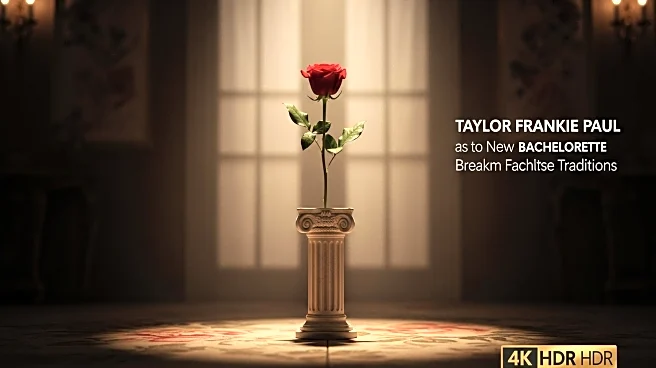What's Happening?
Taylor Frankie Paul, a 31-year-old TikTok star known for her role in 'The Secret Lives of Mormon Wives,' has been announced as the lead for Season 22 of 'The Bachelorette.' This marks a significant departure from the show's tradition, as Paul has never appeared on 'The Bachelor,' the usual precursor for Bachelorette leads. ABC made the announcement during her appearance on the 'Call Her Daddy' podcast. Paul, who gained fame through MomTok on TikTok, brings a unique perspective to the show as a single parent with three children. Her casting is seen as a move to connect with older audiences and single parents, reflecting a shift in the show's demographic focus.
Why It's Important?
Taylor Frankie Paul's casting as the Bachelorette is significant as it challenges the traditional format of the franchise, potentially broadening its appeal to a more diverse audience. By featuring a lead who is a single parent, the show may resonate more with viewers who have similar life experiences, thus expanding its reach. This decision also highlights the influence of social media personalities in mainstream entertainment, as Paul transitions from TikTok fame to a major television role. The move could signal a trend towards more inclusive and varied representations in reality TV, impacting how networks approach casting decisions.
What's Next?
Season 22 of 'The Bachelorette' is set to premiere in 2026, with filming expected to begin late 2025 or early 2026. As production schedules unfold, viewers can anticipate social media buzz and casting announcements. The show's approach to featuring a lead with children may influence future casting choices, potentially leading to more diverse narratives in reality TV. Additionally, Taylor Frankie Paul's crossover from TikTok to television could inspire other social media influencers to pursue similar opportunities, reshaping the landscape of reality entertainment.
Beyond the Headlines
Taylor Frankie Paul's role as the Bachelorette could have deeper implications for the franchise and reality TV as a whole. Her presence may challenge stereotypes about single parents and older women in dating contexts, promoting a more inclusive narrative. This shift could encourage networks to explore unconventional casting choices, reflecting broader societal changes in perceptions of family and relationships. Furthermore, the integration of social media stars into traditional media formats may continue to blur the lines between digital and television entertainment, influencing how audiences engage with content.









